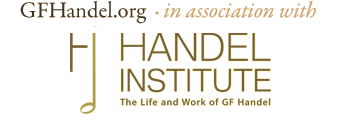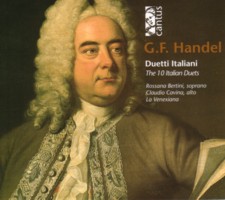Emmanuelle Haïm’s debut disc of allegedly
‘Arcadian’ Duets (Virgin Veritas) was one of the most prominent Handel
recordings released in 2002. It has already won many friends, and is now
the apparent benchmark by which all recordings of Handel’s chamber duets
must now be measured. Haïm’s success is partly due to the understandable
attempts to avoid potential monotony in a disc full of chamber duets often
containing similar sentiments and all accompanied by only a continuo
section. This is certainly enhanced by her impressive roster of soloists
including Natalie Dessay, Patricia Petibon, Véronique Gens, Sara Mingardo,
Brian Asawa, Paul Agnew, and numerous other fashionable singers. Haïm’s
ensemble Le Concert d’Astrée provides the singers colourful support, and
the overall recording is far from dull. Indeed, it is so far towards the
opposite extreme of dull that opinion has been sharply divided about it.
One common criticism of Haïm’s fascinating disc is that her singers are
uneven: while baroque specialists such as Sara Mingardo are captivating,
other more apparently ‘versatile’ singers produce a sound that is not
compatible with period instrument textures and lack the required agility
and clarity that one expects from the best ‘early music’ performances.
While nobody can doubt the luxuriousness of Haïm’s disc, it does not seem
that all the singers blend in a manner that renders their egos subservient
to Handel’s music.
There can be no equivalent accusations of imbalance or idiosyncratic
self-indulgence on this wonderful reissue by La Venexiana. Their concept
of grouping together a certain category of Handel’s duets for soprano and
alto is entirely successful, and justifies having this disc as both an
alternative and a supplement to ‘Arcadian Duets’. The extensive
documentation is a little long-winded, but is commendably thorough despite
some extravagant statements. It is also attractively illustrated, and
sheds plenty of light on both the repertoire and the philosophy behind
these particular performances.
It may be that the direct resonant style and prominent driving harpsichord
employed by La Venexiana may not suit everybody, but Rossana Bertini and
Claudio Cavina share the same appealing Latin spirit and declamatory
emphasis as Haïm’s singers, and are more consistently aware of both each
other and the direction Handel’s music is going in. They also use far less
excessive vibrato and are much more judicious with ornamentation than
Haïm’s guiltiest offenders. Neither singer suavely smoulders like their
superiors on Haïm’s disc, and it is true that occasionally Cavina hoots
his falsetto a little too much and Bertini can be harsh with her highest
notes. Yet La Venexiana’s phrasing of the music and comprehension of the
poetry is perfect, and eclipses the rough aspects of their intonation for
this particular listener. The moderately reverberant recorded sound and
immediacy of the singers highlights their flaws, but it also creates a
genuine atmosphere of chamber performance.
Perhaps in a perfect world we could have had Haïm’s singers controlled by
Claudio Cavina, whose direction is utterly delightful, and not in the
least part monotonous. Indeed, Cavina’s thoughtful and tasteful direction
triumphantly demonstrates the abundance of wealth and variety in music
that on paper is evidently formulaic and risks tedium. There are no dull
moments, for these interpretations are alert, infectious, and
irrepressibly fresh.
La Venexiana’s recordings of Monteverdi (on the
Glossa label) have brought them
an enviable reputation as masters of the Italian madrigal since this disc
of Handel duets was made six years ago. There are not many recordings of
Handel’s chamber duets: I would not go so far as to suggest that La
Venexiana’s disc is the best of a small bunch, but the currently available
options do not get much better than their ravishing “Langue, geme”. It is
refreshing that the ensemble is intent on beautification and refined
theatrical expression rather than resorting to provocation or
concentrating solely on flamboyant execution. Essential ingredients of
these duets such as eroticism, tenderness, and playfulness are not
diminished by an elegant and idiomatic approach.




